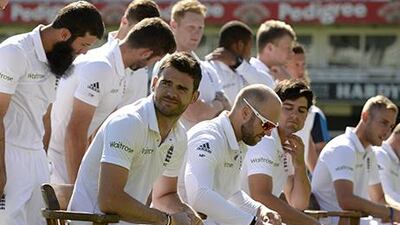The International Cricket Council (ICC) has tried to play peacemaker between the India and England boards in the hope of resolving a spat that has sprung from an altercation between James Anderson and Ravindra Jadeja.
The ICC failed, as did talks between the two boards, and Anderson has been charged with the most serious breaches of the players’ code of conduct in six years.
The pair clashed during the lunch interval of the second day of the first Test.
The incident has led the Indian team manager Sunil Dev into pressing Level 3 charges against Anderson.
The ICC detailed the allegations on Tuesday. “Anderson has been charged for allegedly abusing and pushing Ravindra Jadeja immediately after they left the field for lunch on Thursday. It is alleged that this was a continuation of a verbal altercation between Anderson and Jadeja as they were walking from the field.”
Specifically, the charge falls under Article 2.3.3, which states: “Where the facts of the alleged incident are not adequately or clearly covered by any of the above offences, conduct that either: (a) is contrary to the spirit of the game; or (b) brings the game into disrepute.”
That is not as serious as, for instance, a charge of outright physical assault or racism but it is serious enough that the England paceman, if found guilty, could be banned for two or more Tests.
The England and Wales Cricket Board (ECB) expressed its surprise and anger over the move, not denying that an incident took place, but arguing that it was a “minor” one.
The National understands that the notice of the charge was made officially after the two boards and the ICC had tried to resolve the matter over the weekend.
The Board of Control for Cricket in India (BCCI) informed the legal head of the ICC of the incident on Friday, during lunch on the third day of the Test. That was within 24 hours of its occurrence.
Immediately, the ICC flew out a member of its legal department to the UK to conduct a review of the allegations and to see whether there was a case to be answered.
Preliminary evidence was gathered, including speaking to players and officials who witnessed the incident, and confirmed to the ICC that there was substance to the allegations.
On Sunday, the BCCI informed the ECB of its intentions to press charges, precipitating private discussions between the two boards and the ICC in a bid to find an amicable resolution.
By Tuesday no solution had been found, which led the ICC to issue its notice and the ECB to respond.
Under the ICC’s code of conduct, because of the gravity of the charges, a judicial commissioner and not a match official must oversee the hearing into the charges, which is to be conducted within 14 days.
An ECB official has confirmed that the England board was filing Level 2 charges against Jadeja.
Anderson is the first player to be charged under a Level 3 offence since Harbhajan Singh, in his infamous “Monkeygate” racism row with Australian Andrew Symonds in January 2008, when the charges were not proven.
The spat comes at a complicated time for the two boards. They are allies in the vast financial and administrative restructuring of the sport, as part of the Big Three that includes Cricket Australia.
Additionally, N Srinivasan, the sidelined BCCI president, took over as ICC chairman at the end of last month.
Such remains his influence that it is unlikely the BCCI would have made an official complaint without Srinivasan’s approval. That, ultimately, pits him against his Big Three ally, Giles Clarke, the ECB head.
osamiuddin@thenational.ae
Follow our sports coverage on Twitter @SprtNationalUAE and Osman Samiuddin @OsmanSamiuddin

